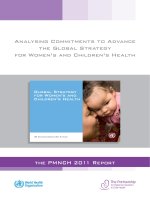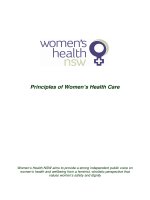Refusal Laws: Dangerous for Women’s Health doc
Bạn đang xem bản rút gọn của tài liệu. Xem và tải ngay bản đầy đủ của tài liệu tại đây (212.23 KB, 10 trang )
Refusal Laws: Dangerous for Women’s Health
Refusal laws (sometimes called “conscience” laws) permit a broad range of individuals and
institutions—including hospitals, hospital employees, health-care providers, employers, and
insurers—to refuse to provide, pay, counsel or even refer for medical treatment.
This fact sheet discusses the history of refusal laws and some of their many effects on
Americans’ ability to access quality, comprehensive health care. For more detail about each of
the specific laws, see the fact sheet entitled, “Current Refusal Laws.”
The Origin of Refusal Laws
Refusal laws were first enacted immediately after Roe v. Wade.
1
In response to Roe, in 1973
Congress adopted an amendment named after then-Sen. Frank Church (D-ID), allowing
individuals or entities that receive certain federal funds to refuse to provide abortion or
sterilization if such services are contrary to their religious or moral beliefs.
2
In 1974, the statute
was amended in a bill authorizing biomedical and behavioral research and training to include
broad language stating that no individual may be required to perform or assist in performing
health-care services or research activities funded by the Department of Health and Human
Services (HHS); however, the extent to which this broad language can be applied has not yet
been fully determined. Following Congress’ lead, 47 states and the District of Columbia passed
laws that permit certain medical personnel, health facilities, and/or institutions to refuse to
provide abortion care,
3
most of which were enacted shortly after Roe.
4
In the years following,
lawmakers enacted refusal laws only in isolated circumstances.
5
Regrettably, recent years have seen a resurgence of legislative activity related to refusal laws.
6
At the federal level, in 2005 anti-choice members of Congress passed a sweeping law known as
the Federal Refusal Clause,
7
which permits health-care companies to refuse to comply with
federal, state, and local laws and regulations that pertain to providing, counseling for, referring
for, and paying for abortion services. In other words, it grants a broad variety of health-care
entities – including hospitals, HMOs, and insurance companies – the right to refuse to provide,
pay for, or refer for abortion. In December 2008, the Bush administration’s Department of
Health and Human Services (HHS) published a regulation that further expanded refusal rights;
the regulation offered broad rights to employees who were only tangentially involved in
providing the services at issue (for example, receptionists scheduling appointments).
8
On
February 18, 2011, the Obama administration rescinded the key elements of this Federal Refusal
Rule.
9
The rescission eliminated the rule’s troublesome definitions that could have been
2
interpreted to allow health-care providers to refuse to provide contraception in addition to
abortion care. The repeal clarified that federal refusal laws were not intended to allow
providers to refuse to treat an individual because he or she engaged in behavior the provider
found objectionable. The administration also rescinded the rule’s burdensome certification
requirement imposed on health-care organization. The regulation retained only the section of
the Federal Refusal Rule that provides for an enforcement process, establishing that the Office
of Civil Rights at HHS is authorized to receive and investigate complaints regarding alleged
violations of federal refusal statutes
Broad Loopholes = Access Denied
Carefully crafted refusal laws may be appropriate in some circumstances to protect individual
medical providers. However, broad refusal laws have negative consequences by denying
women medically necessary information, referrals, or services. For example, broad refusal laws
may allow:
Employers who oppose birth control on religious grounds to refuse to provide
contraceptive coverage in their health plans, even when employees do not share the
same religious views as their employer;
Pharmacists who erroneously believe that birth-control pills cause abortion to refuse to
dispense, or provide referrals for, lawfully prescribed oral contraceptive medications;
Health-care professionals who object to contraception or abortion to deny their patients
information on, or a referral for, family-planning services, regardless of the patient’s
health-care needs.
Refusal laws also can affect a broad range of reproductive-health services, including:
information and referrals for family planning, genetic counseling, infertility treatment, sexual-
assault treatment, sterilization, STD and HIV testing, and abortion care.
Refusal Laws Especially Affect Low-Income Women and Women of Color
Broad refusal laws that allow individuals and entities to refuse to provide or cover medical
services have a disproportionate impact on low-income women who depend on federal
programs for affordable health care. These refusal laws can jeopardize women’s access to
comprehensive reproductive-health information and services under two programs specifically
intended to serve low-income individuals: Medicaid and the federal Title X program.
In addition, women of color, who disproportionately work in low-wage jobs that do not offer
benefits,
10
turn at higher rates to public programs such as Medicaid and Title X for affordable
health care, and are therefore disproportionately affected by broad refusal laws. In 2006,
3
women of color made up 51 percent of non-elderly Medicaid beneficiaries, but less than 20
percent of the general population.
11
A 2006 report found that 19 percent of all Title X clients are
black and 23 percent identified as Hispanic or Latino,
12
although they make up 13 and 14
percent of the population, respectively.
13
Also, low-income women and women of color face several barriers to health-care services that
make it particularly burdensome for them to find alternate providers in the event that a
provider refuses to offer services. A study by the Kaiser Family Foundation found that low-
income women face twice as much difficulty as other women in obtaining the flexible work
schedules, transportation, and child care necessary to access health-care services.
14
In addition,
the United States Office of Women’s Health found that “[s]everal…factors limit the access of
minority women to the U.S. health care system. They include social disadvantages, cultural
values, discrimination, lack of culturally appropriate services, inadequate childcare, and
transportation.”
15
Refusal laws further increase the challenges faced by low-income women and
women of color accessing health care.
Comprehensive Medical Information – Not Politics, Religion, or Ideology –
Should Determine Health-Care Decisions
Health-care providers have a duty to ensure that women receive accurate information and
appropriate care. Failure to provide this care—even for religious, political, or ideological
reasons—jeopardizes women’s health and violates bedrock principles of medical ethics.
Refusal laws violate informed consent principles. When health-insurance companies
and managed-care plans withhold information from women about their health options,
they trample on a bedrock principle of medical ethics: informed consent. Under this
doctrine, patients must be informed of the risks, benefits, and alternatives to treatment.
The American Medical Association has emphasized, “The patient’s right to self-decision
can be effectively exercised only if the patient possesses enough information to enable
an intelligent choice.”
16
Failure to provide full information about all relevant medical options violates
standards of care. In Brownfield v. Daniel Freeman Marina Hospital, a court ruled that a
rape survivor who was denied information about emergency contraception at a Catholic
hospital emergency room could sue for medical malpractice. The court asserted that a
woman’s ”right to control her treatment must prevail over [a hospital’s] moral and
religious convictions.” Further, it is the hospital’s duty to provide full information about
all medical options in order to protect patients’ right to choose whether to undergo
medical treatment. As the court stated, “Meaningful exercise of this right is possible
only to the extent that patients are provided with adequate information upon which to
base an intelligent decision.”
17
4
Institution-wide refusal laws can, paradoxically, trample on the consciences of
individual health-care providers. For example, if a legislature enacts a broad refusal
law for insurance companies, an insurer may refuse to cover sterilization counseling,
referrals, or services. A physician in such a plan who determined that a patient faced
life-threatening circumstances if she became pregnant again and that sterilization would
be in her best interests would be prohibited from providing the woman with
appropriate information, referrals, or treatment. This tramples not only on the
conscience rights of the patient but also on those of the doctor. Anti-choice activists,
who often claim to care about doctors’ consciences, conveniently ignore this
consequence.
Refusal Laws Endanger Women’s Health
When health-care institutions and providers deny women access to information about all their
health-care options, they can compromise women’s health.
Of course, pregnancy is a welcome development in many women’s lives. But for some
others, pregnancy can be dangerous, making access to contraceptives and abortion
services imperative. For instance, conditions such as cancer, rheumatic fever, severe
diabetes, malnutrition, phlebitis, sickle cell anemia and heart disease, significantly
increase the risks associated with pregnancy.
18
Women in rural areas may face serious health risks if the only hospital in their area
refuses to provide certain reproductive-health services. One Catholic sole-provider
hospital in rural California denied a sterilization to a 34-year-old woman following her
ninth pregnancy. Although the woman’s doctor advised her against any subsequent
pregnancies, and sterilization would have been safest and easiest immediately following
delivery, the hospital refused to permit the procedure.
19
Fifty-five percent of Catholic hospitals do not provide emergency contraception—a
concentrated dose of ordinary birth control pills that prevents pregnancy after sex—
even to women who have been raped.
20
For example, in 1992, 14 Catholic hospitals in
Chicago treated an estimated 1,004 rape survivors but refused to offer them emergency
contraception.
21
The Public Opposes Refusal Laws
Nearly nine out of 10 Americans oppose refusal laws that allow certain institutions to
refuse to provide health-care payment or services.
22
5
Eighty-five percent of women believe that hospitals that receive government funds
should not be allowed to prohibit doctors from providing any legal, medically
appropriate service.
23
Opposition to Refusal Laws: Americans oppose refusal laws that allow institutions to
deny health-care access:
Mergers in the Health-Care Industry Exacerbate the Impact of Refusal Laws
Across the country, health-care organizations have been consolidating in an effort to reduce
costs and compete more successfully in the market. Catholic hospitals “constitute the largest
single group of the nation’s not-for-profit hospitals,” operating 16.1 percent of total hospital
beds in 2001.
24
The Catholic Church’s influence is spreading through mergers and affiliations
between Catholic and nonsectarian hospitals. When nonsectarian hospitals merge with Catholic
hospitals, they are pressured to adopt the rules governing Catholic hospitals, which are laden
with policies forbidding various types of services.
25
Mergers between Catholic health-care
providers and nonsectarian providers curtail access to reproductive services, often without the
knowledge of the patients served by the merged hospitals and health plans.
26
Catholic teaching explicitly disapproves of contraceptive methods other than natural
family planning (the rhythm method).
27
The Ethical and Religious Directives for Catholic Health Care Services denounce assisted
reproductive technologies such as in vitro fertilization and sperm donation, prohibit
abortion care, prohibit treatment for an ectopic pregnancy, prohibit contraception other
than natural family planning, ban prenatal diagnosis when undertaken with the
intention of terminating the pregnancy if a serious anomaly is discovered, and bar
permanent and temporary sterilization of both men and women.
28
89%
oppose allowing
insurance
companies to deny coverage for
medical services.
88%
oppose allowing
pharmacies
to
refuse to fill a prescription.
86%
oppose allowing
employers
to
exclude coverage for medical
services from their employees’ health
plans.
Source: American Civil Liberties Union (endnote 23).
6
Between 1990 and 2001, an estimated 50 percent of mergers between Catholic and non-
Catholic hospitals resulted in the elimination of some or all reproductive-health
services.
29
For instance, when Catholic Healthcare West replaced Gilroy, California’s
only community hospital, with a Catholic hospital, all contraceptive services,
sterilizations, and abortion services were eliminated, forcing women to travel 25 to 35
miles to receive basic family-planning care.
30
More recently, a patient denied
termination of a doomed pregnancy at a New Hampshire hospital was forced to travel
80 miles by cab to the nearest hospital not under religious restrictions.
31
Narrow Refusal Laws Allow Religious Freedom
Without Seriously Compromising Women’s Health
Anti-choice proponents of refusal laws claim that without such provisions, religious
organizations would be forced to abandon their principles. However, such refusal laws often
exempt a broad range of organizations, including health plans and hospitals, most of which not
only have a secular purpose, but also employ and serve individuals who do not share those
organizations’ religious beliefs. Court decisions in California and New York upheld narrow
refusal laws and made clear that institutions may not impose one particular religious view on
the general public.
Catholic Charities v. Superior Court: In 2000, Catholic Charities of Sacramento filed suit
against the state of California, claiming that the state’s contraceptive coverage law is
unconstitutional because it forces the agency to violate its religious beliefs by providing
contraceptive benefits to its employees. The law contains a “religious employer”
exemption, but Catholic Charities did not qualify for it. Recognizing that the law was
designed to remedy gender discrimination, and not to intervene with church conflict,
the California Supreme Court upheld its constitutionality. The court rejected all eight
constitutional challenges asserted by Catholic Charities, and held that the law does not
interfere with the autonomy of a religious organization or impermissibly burden the
right of free exercise.
32
In October 2004, the United States Supreme Court declined to
hear the case, letting the California Supreme Court ruling stand.
33
Catholic Charities v. Serio: Ten faith-based social services organizations filed a similar
lawsuit in opposition to New York’s contraceptive-equity law in 2002.
34
They claimed
that the law violated the New York and U.S. Constitutions. In October 2006, New York’s
highest court held that the law did not violate the state or federal Free Exercise Clauses
or the federal Establishment Clause, which forbid the government from prohibiting the
exercise of free religion, and therefore, the organizations were not constitutionally
entitled to be exempt from its provisions.
35
Refusal Laws in the States
7
Forty-seven states and the District of Columbia have laws that allow certain individuals
or entities to refuse to provide women specific reproductive-health services,
information, or referrals: AK, AZ, AR, CA, CO, CT, DC, DE, FL, GA, HI, ID, IL, IN, IA,
KS, KY, LA, ME, MD, MA, MI, MN, MS, MO, MT, NE, NV, NJ, NM, NY, NC, ND, OH,
OK, OR, PA, RI, SC, SD, TN, TX, UT, VA, WA, WV, WI, WY.
36
Despite widespread public opposition to refusal laws, 20 of the 28 states with laws or
regulations requiring health insurers to provide equitable coverage for contraception
include refusalprovisions, allowing employers and/or insurers that object on religious or
moral grounds to refuse to provide or pay for contraceptive coverage: AZ, AR, CA, CT,
DE, HI, IL, ME, MD, MA, MI, MO, NV, NM, NY, NJ, NC, OR, RI, WV.
37
Conclusion
Traditionally, refusal laws have recognized the complexity of human values, feelings, and
religious beliefs by enabling individuals to opt out of providing health-care services to which
they are religiously or morally opposed. However, efforts in Congress and state legislatures to
expand refusal laws to employers, health insurers, and pharmacists and to preclude not only
services, but information and referrals, pose serious dangers to Americans’ health. Science – not
politics – should determine medical decisions. Health-care institutions hold themselves out as
providers of health care; they should have a duty to ensure that patients receive accurate
information and appropriate care. Failure to provide this care—even for religious reasons—is
wrong and may jeopardize patient health.
January 1, 2012
Notes:
1
Roe v. Wade, 410 U.S. 113 (1973).
2
Church amendment to the Public Health Service Extension Act of 1973, Pub. L. No. 93-45, Tit. IV, § 401,
87 Stat. 95 (codified at 42 U.S.C.A. § 300a-7).
3
NARAL PRO-CHOICE AMERICA FOUNDATION, Who Decides? The Status of Women's Reproductive Rights in
the United States (20th ed. 2011), at www.WhoDecides.org. In addition, West Virginia has a statute that
provides an opt-out for physicians or persons who object to performing or assisting in an abortion on a
minor. W. VA. CODE § 16-2F-1 to -9.
4
Rachel Benson Gold, Conscience Makes A Comeback In the Age of Managed Care, GUTTMACHER REP. ON PUB.
POL’Y, Feb. 1998, at 1.
5
In 1988, Congress inserted a refusal clause in the appropriations for the Bureau of Prisons, providing
that funds could not be used to require any person to perform or facilitate an abortion for a prisoner.
Dep’ts of Commerce, Justice, and State, the Judiciary and Related Agencies Appropriations Act of 1988,
8
Pub. L. No. 100-459, 102 Stat. 2186 (Oct. 1, 1988). In 1996, Congress enacted a bill providing that
accreditation of postgraduate physician training programs could not be withdrawn based solely on a
refusal to provide training in abortions. Omnibus Consolidated Recessions and Appropriations Act of
1996, Pub. L. No. 104-134, 110 Stat. 1321 (Apr. 25, 1996) (codified at 42 U.S.C.A. § 238n).
6
For example, in 2006, 21 states considered 51 measures that would restrict women’s access to health
care services by allowing health care entities and/or individuals to refuse to provide medical services.
NARAL PRO-CHOICE AMERICA & NARAL PRO-CHOICE AMERICA FOUNDATION, Who Decides? The Status
of Women's Reproductive Rights in the United States (16th ed. 2007); In 2007, 11 states considered 20 such
measures and in 2008, 13 states considered 21 measures. NARAL PRO-CHOICE AMERICA & NARAL PRO-
CHOICE AMERICA FOUNDATION, Who Decides? The Status of Women's Reproductive Rights in the United
States (17th ed. 2008) and NARAL PRO-CHOICE AMERICA FOUNDATION, Who Decides? The Status of
Women's Reproductive Rights in the United States (18th ed. 2009).
7
FY’05 Consolidated Appropriations Act, Pub. L. No. 108-447, 118 Stat. 2809 (Dec. 8, 2004).
8
Ensuring That Department of Health and Human Services Funds Do Not Support Coercive or
Discriminatory Policies or Practices in Violation of Federal Law, 73 Fed. Reg. 78,072 (Dec. 19, 2008).
9
Regulation for the Enforcement of Federal Health Care Provider Conscience Protection Laws, 45 CFR
Part 88 (Feb. 18, 2011).
10
Kaiser Family Found., Racial and Ethnic Disparities in Women’s Health Coverage and Access to Care:
Findings from the 2001 Kaiser Women’s Health Survey 2 (Mar. 2004), available at
/>Coverage-and-Access-to-Care.pdf.
11
Kaiser Family Found., Issue Brief: Medicaid’s Role for Women 1 (May 2006) available at
12
Research Triangle Institute, Family Planning Annual Report, 2005, (Nov. 2006).
Overall, 64 percent of Title X clients are classified as White—the percentages total more than 100 because
some clients self-identify as Latino in regard to ethnicity but as White in terms of race.)
13
U.S. Census Bureau. “African-American History Month: February 2006.” Facts for Features. January 25,
2006; “Hispanic Heritage Month, September 15-October 15, 2006,” September 5, 2006.
14
Kaiser Family Found., Women and Health Care: A National Profile 24 (July 2005), available at
/>from-the-Kaiser-Women-s-Health-Survey.pdf.
15
U.S. Dept. of Health & Human Services, Office on Women’s Health, The Health of Minority Women 4
(July 2003), available at
16
Council on Ethical and Judicial Affairs, American Medical Association (AMA), Informed Consent,
Ethical Opinion E-8.08, CODE OF MEDICAL ETHICS, at />resources/medical-ethics/code-medical-ethics/opinion808.shtml.
17
Brownfield v. Daniel Freeman Marina Hospital, 208 Cal. App. 3d 405, 412-14 (Ct. App. 1989).
18
Harris v. McRae, 448 U.S. 297, 339 (1980) (Marshall, J., dissenting).
19
ACLU Reproductive Freedom Project, American Civil Liberties Union (ACLU), Religious Refusals and
9
Reproductive Rights, at 2 (2002), citing Leslie Laurence, The Hidden Health Threat That Puts Every Woman At
Risk, REDBOOK, July 2000, at 112, 114.
20
Teresa Harrison, Availability of Emergency Contraception: A Survey of Hospital Emergency Department Staff,
ANNALS OF EMERGENCY MED. (Has not been published as of May 16, 2005).
21
Liz Bucar & David Nolan, Emergency Contraception and Catholic Health Care, CONSCIENCE: A
NEWSJOURNAL OF PROCHOICE CATHOLIC OPINION (1999), citing Cecile Bouchardeau, Catholic Hospitals
Deny Rape Victims Choice, CHI. REP., Oct. 1993.
22
ACLU Reproductive Freedom Project, American Civil Liberties Union (ACLU), Religious Refusals and
Reproductive Rights, at 20 (2002).
23
CFFC, Religion, Reproductive Health and Access to Services: A National Survey of Women (poll conducted by
Belden Russonello & Stewart) (Apr. 2000), at
/>sstoservices.pdf (last visited Sept. 28, 2011).
24
Mergerwatch & Family Planning Advocates of New York State, No Strings Attached: Public Funding of
Religiously-Sponsored Hospitals in the United States, at 24 (2002).
25
CFFC, Caution: Catholic Health Restrictions May be Hazardous to your Health, at 4 (1999); Mergerwatch &
Family Planning Advocates of New York State, No Strings Attached: Public Funding of Religiously-
Sponsored Hospitals in the United State, at 21-25 (2002).
26
In a 1995 survey, 73 percent of women were not aware that belonging to a Catholic health-care plan
would limit their access to medical procedures such as family planning, abortion, vasectomies, in vitro
fertilization, and emergency contraception for rape victims. CFFC & EDK ASSOCIATES, INC., Health Care
Reform Crossroads: The Gap Between Catholic Church Mandates and Women's Needs, at 10 (1995).
27
NATIONAL CONFERENCE OF CATHOLIC BISHOPS, Ethical and Religious Directives for Catholic Health Care
Services, at 18 (1994).
28
NATIONAL CONFERENCE OF CATHOLIC BISHOPS, Ethical and Religious Directives for Catholic Health Care
Services, at 17-20 (1994).
29
CFFC, CATHOLIC HEALTH CARE UPDATE, The Facts about Catholic Health Care, July 2002.
30
Maria Alicia Gaura, Newly Catholic Hospital Bans Family Planning, S.F. CHRON., Oct. 1, 1999.
31
Lois Utley, Hospital Mergers 101: Countering the Threat to Patient’s Rights and Access to Care from
Religious/Secular Hospital Mergers, The MergerWatch Project, 2005.
32
Catholic Charities of Sacramento, Inc. v. Superior Court, 85 P.3d 67 (Cal. 2004); cert. denied, No. 03-1618 (U.S.
Oct. 4, 2004).
33
Catholic Charities of Sacramento, Inc. v. Superior Court, 85 P.3d 67 (Cal. 2004); cert. denied, No. 03-1618 (U.S.
Oct. 4, 2004).
34
Clifford J. Levy, Bishops Sue State to Block Coverage for Birth Control, N.Y. TIMES, Dec. 31, 2002, at B5.
35
Catholic Charities of the Diocese of Albany v. Serio, 7 N.Y. 3d 510. (App. Div., 2006).
36
NARAL Pro-Choice America Foundation, Who Decides? The Status of Women's Reproductive Rights in the
United States (20th ed. 2011), at www.WhoDecides.org.
10
37
See generally, NARAL Pro-Choice America Foundation, Who Decides? The Status of Women's Reproductive
Rights in the United States (20th ed. 2011), at www.WhoDecides.org.









